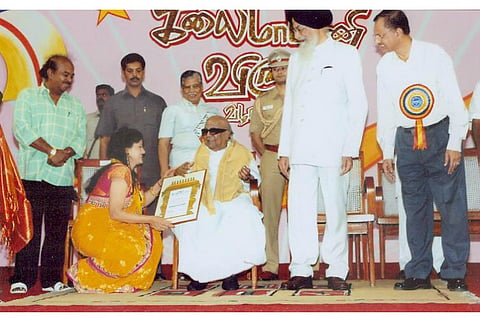

“If you throw a stone in Bangalore, you’ll hit an IT guy. If you throw a stone in Madras, you’ll hit a Kalaimamani awardee,” says a seasoned observer of Tamil Nadu’s art scene when asked about the Kalaimamani.
Over the years, industry insiders say that the credibility of the Kalaimamani has taken a sound beating, with various allegations being made on how some of the awardees are selected.
The Kalaimamani awards were constituted by the Tamil Nadu government in the year 1954. The Tamil Nadu Isai Nataka Manram, a unit of the Directorate of Art and Culture of the TN government, is now the implementing agency for the award. If the TN government manual is anything to go by, the criteria for eligibility are pretty vague. “The artiste should be popular and famous for having professionally rendered yeoman services for enrichment of the traditional arts,” says the note.
It adds, “The Kalaimamani Award is conferred on the performing artistes with lasting contribution, popularity and merit of the art disciplines of Tamil Literature, Music, Bharathanatyam, Drama, Film, Folk arts, Painting, Sculptures, Vigadam etc.”, quite literally throwing open the award to virtually anybody remotely related to art. So far, more than 1500 artists have been given the Kalaimamani.
In the past four years, the award has not been given to anyone. In 2011, the government of Tamil Nadu, under the DMK, awarded it to 26 artists, including several young films stars. In 2009, 74 were chosen for the award. Since 2011, the Jayalalithaa government has not awarded anyone with the Kalaimamani.
Speaking to Thanthi TV about it, famous singer Nithyashree Mahadevan says that the award is highly respected. “Wherever we go people ask if you have got the Kalaimamani, the award commands respect,” she says, lamenting the fact that the award has not been given to anyone since 2011.
Not everyone agrees with her, and the problem goes beyond the fact that it has not been awarded to anyone. Although not many are willing to talk about it openly.
The reputation of the award is so bad that many artists have even refused to accept it in the past.
“A couple of years ago, I got a call from a very unreliable person stating I have been selected for the award. But it came with a rider that I might have to do something in return. I simply refused,” says a popular musician based in Chennai, strictly under the condition of anonymity.
“It is a bit of a farce,” says another artist, “but not everyone who gets the award is undeserving,” he says cautioning against any generalization that everyone who gets the award is not worthy of it.
Among those who are willing to speak about this, and boldly so, is accomplished dancer and choreographer with a career spanning several decades, and a Kalaimamani awardee herself, Anita Ratnam.
“I don’t like to put it in front of my name like many others do,” she says, speaking to The News Minute.
Anita Ratnam. Image: © Raimond Spekking / , via Wikimedia Commons
She points out several problems with how the awardees are chosen. “Giving awards to film-stars and politicians, just because they have two hits or whatever it is, diminishes the quality of the award as compared to those who given their life to what they do,” says Anita.
“I got the Kalaimamani award when then Chief Minister Karunanidhi turned 75, so the government gave the award to 75 artists, which was a large number,” she recounts, “But that year there was a lot of unevenness, and I noticed it and wondered why some of them were getting an award.”
And then, there is the touchy and controversial subject of caste divisions. “It is very much in politics and it continues to be the elephant in the room in the classical arts,” says Anita, adding, “I have seen that the award committee has tried to pointedly find people who are not from the forward community just to get the numbers or the proportions right. There are several people from across the board and from all communities who deserve the award.”
She also says that she has heard that the award was up for sale, echoing what several other artists say. “I have heard people saying that the going price for the award was several lakhs. But I have heard such allegations about the Padma awards also,” she says, wondering what the inroads were for middlemen who are known to sell the award.
But most agree that the problems with Kalaimamani cannot be seen in isolation.
“If we look at the Padma awards, or other awards where the government has a say, the credibility has diminished,” says Anita.
The Sangeet Natak Academy awards in Delhi are also one year behind schedule. It also goes to show that governments care the least about art in general, say artists and critics.
Artists agree that the government should first simply start taking more interest in the arts, and they should constitute a committee of people who have already received the award who should select the deserving candidates.
“The Kalaimamani still does mean something to a lot of artists, it gives them that moment of pride,” says Anita Ratnam.
Chitra Vishweswaran, Member-Secretary of the TN Eyal Isai Nataka Manram, was not available for comment.
Image: Source